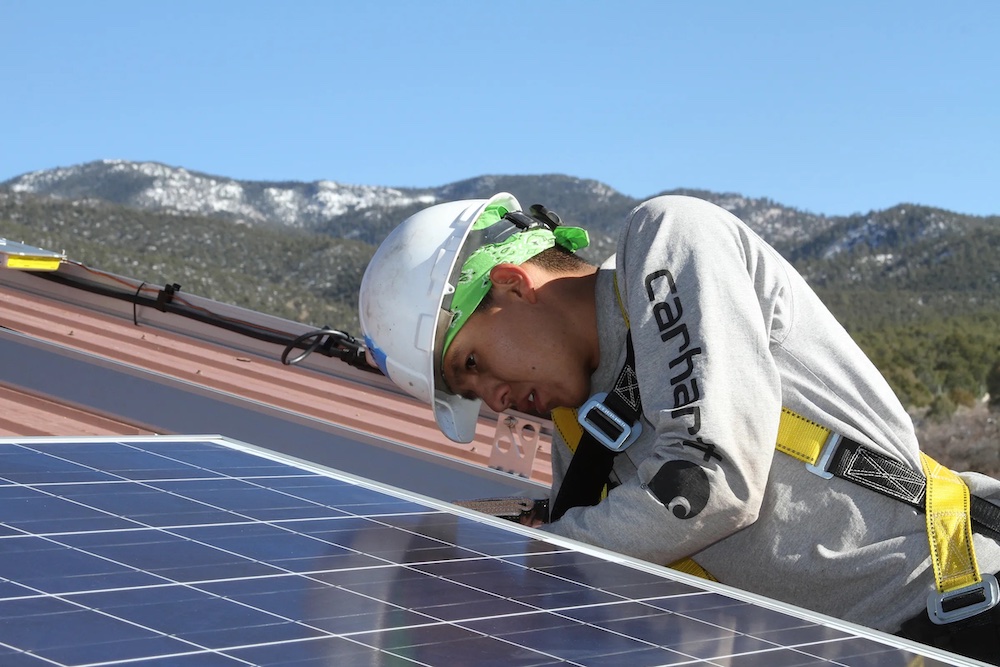
- Details
- By Brian Edwards
- Energy | Environment
The Biden administration announced $20 billion in climate finance grants today, with a significant amount headed to tribal communities.
Vice President Kamala Harris and Environmental Protection Agency Administrator Michael S. Regan traveled to Charlotte, N.C. to announce eight organizations that will receive grants from two competitions within the $27 billion Greenhouse Gas Reduction Fund (GGRF), which was created under the Inflation Reduction Act (IRA). Harris cast the tie-breaking vote in the Senate to pass the IRA in 2022.
The eight organizations selected for the Biden administration's “national green bank” grants will deploy the capital nationally to fund clean energy projects, with at least 70% of the funds invested in low-income and disadvantaged communities. Nearly $1.5 billion dollars are expected to flow into Indian Country under the two GGRF programs, according to an EPA statement shared during a press call Wednesday afternoon.
The three organizations selected under the $14 billion National Clean Investment Fund (NCIF) and five selections under the $6 billion Clean Communities Investment Accelerator (CCIA) will create a national clean-financing network for renewable energy projects, according to Biden administration officials. By financing tens of thousands of projects, the network will mobilize private capital to reduce air pollution and dampen the effects of climate change, while also reducing energy costs and creating clean energy jobs across the country, officials said.
“When President Biden and I made the largest investment in our nation's history to address the climate crisis and to build a clean energy economy, we made sure that every community would be able to participate and benefit,” Harris said. “The grantees announced today will help ensure that families, small businesses, and community leaders have access to the capital they need to make climate and clean energy projects a reality in their neighborhoods.”
The grant recipients will deliver capital to communities “that for too long have been shut out of resources to lower costs and benefit from clean technology solutions,” Regan said. The funding will deliver “transformational investments” that will help finance projects like putting solar on small businesses, electrifying affordable housing and providing EV loans for young families, Regan said. “That translates to good-paying jobs, energy bill savings and cleaner air.”
Nearly a one-and-a-half billion dollars have been dedicated to tribal communities by the selected applicants, according to the EPA.
Climate United, a consortium of mission-driven lenders and investors, will receive nearly $7 billion under NICF. The nonprofit formed by Calvert Impact, Self-Help Ventures, and Community Preservation Corporation will focus on investing in hard-to-reach market segments with at least 10% of its investment going to tribal communities.
Native CDFI Network, a nonprofit that serves as the national advocate for Native community development financial institutions (CDFIs) will receive a $400 million award to fund clean energy loans in Indian Country via a network of 63 Native CDFIs and other CCIA-qualified community lenders.
Justice Climate Fund, which will receive a $940 million award, is expected to deploy some of its capital in Indian Country via a partnership with Longmont, Colo.-based Oweesta Corporation, a Native CDFI intermediary that provides direct investments, technical assistance and financial products to Native CDFIs, tribes, and Native-led nonprofits.
Appalachian Community Capital, which will receive $500 million, plans to launch a Green Bank for Rural America to provide capital and capacity-building assistance to hundreds of community lenders working in rural and tribal communities, according to a statement.
Tribal communities could also see funding via initiatives being funded by the other four awardees: Coalition for Green Capital, which received a $5 billion award under NCIF; Power Forward Communities, which got $2 billion under NCIF; Opportunity Finance Network, which received a $2.3 billion award under CCIA; and Inclusive, which received $1.87 billion award under CIA.
The funding is a “landmark opportunity to transform the health and resilience of the places our people call home,” Pete Upton, a member of Ponca Tribe of Nebraska and CEO of the Native CDFI Network, said in a statement. “The CCIA and other EPA Greenhouse Gas Reduction Fund programs provide a level of funding for clean energy projects in low-income and disadvantaged communities that we are unlikely to see again in our lifetimes.”
Collectively, the eight organizations selected for awards have committed to reducing or avoiding up to 40 million metric tons of carbon pollution annually for the next seven years — equivalent to the emissions of nearly 9 million passenger vehicles. The reductions in greenhouse gas emissions are part of the Biden administration’s climate goals of reducing emissions 50 below 2005 levels by 2040 and achieving net-zero emissions by no later than 2050.
In addition, the grantees plan to mobilize almost $7 of private capital for every $1 of federal grant funds — turning $20 billion of public funds into $150 billion of public and private investment.
The funding presents “a once-in-a-lifetime opportunity to tackle the climate crisis while building a stronger economy for all Americans,” Climate United CEO Beth Bafford said in a statement. “An equitable energy transition is the challenge of our time, and we’re ready to get to work.”
